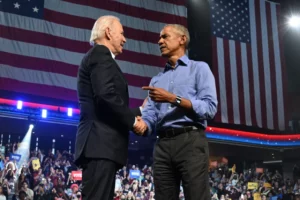
WASHINGTON — Former President Barack Obama quietly advised the White House over the past five months on its strategy to address artificial intelligence, engaging behind the scenes with tech companies and holding Zoom meetings with top West Wing aides at President Joe Biden’s request, according to aides to both men.
The joint effort culminated Monday when Biden signed an executive order establishing some government oversight of AI development. It’s the first time Biden has tapped his former boss to help shape a key policy initiative, aides said, and he did it because Obama shares his views on the issue and brings a certain heft that could help move the process along quickly.
“You have to move fast here, not at normal government pace or normal private-sector pace, because the technology is moving so fast,” White House chief of staff Jeff Zients recalled Biden saying. “We have to move as fast, or ideally faster. And we need to pull every lever we can.”
AI is one of the things that keep both Biden and Obama up at night, their aides said.
Zients said Biden, like Obama, has viewed AI as a technology that demands urgent attention given that it comes with great promise but also potentially dire consequences, depending on how it’s used.
The current and former presidents discussed the issue on a phone call in June, aides to both of them said. They agreed on the goal of maximizing the technology while limiting the risks, according to Obama and Biden aides.
After that, Biden asked Obama to consult with his team to develop a policy that encourages innovation but also directly addresses the dangers of AI, their aides said. They then continued the discussion during a lunch at the White House, they said.
They agreed that they have a “shared vision,” their aides said, and that the federal government should take swift action.
Over the rest of the summer and into fall, Obama kept in regular touch with Zients, deputy chief of staff Bruce Reed and national security adviser Jake Sullivan to offer input on the executive order, Biden and Obama aides said. They said their two teams were in touch about a dozen times, including as the administration finalized the order ahead of Monday’s announcement.
At a signing ceremony for the executive order Monday, Biden called AI “the most consequential technology of our time,” citing fears that AI-enabled cyberattacks and AI-formulated bioweapons could endanger the lives of millions. But if it is used properly, he said, the technology can be incredibly beneficial to developing new drugs and cancer research.
Obama was particularly helpful in laying the groundwork for tech companies to voluntarily sign on to have their AI models pressure-tested before they’re released to the public, Biden and Obama aides said. Part of his approach was to urge industry leaders to consider risks beyond national security, including information integrity, bias and discrimination.
“He helped really set the frame of mind that companies can innovate while also being responsible and that companies need to be accountable,” Zients said.
Obama also reached out to advocacy groups that are concerned about AI, as well as leading academics and researchers who know most about the issue, aides said. He used the conversations to inform the guidance he offered the White House, the aides said.
Obama told industry leaders that it was something he has been concerned about since his second term, when he tasked his administration with releasing a report on the future of artificial intelligence. He sees the swift rise and potential dangers of some social media platforms in recent years as a clear warning sign.
“Those people created platforms that helped us connect in new and exciting ways, but they also failed to anticipate the harm their tools could do. By the time it became clear, much of the damage had already been done,” he wrote this week. “We can’t make the same mistake again.”
The White House is particularly worried about the role AI could play in amplifying misinformation around key elections.
Already, former President Donald Trump, the Republican front-runner in the 2024 presidential race, is amplifying baseless conspiracy theories that imply Obama is somehow secretly still in power, for which there is no evidence.
A longtime “tech skeptic,” Biden has experimented with ChatGPT, an AI-powered language model, and voice-cloning technology, aides said. He has even seen deepfakes of himself, his aides said, some of which were credible enough that he joked to staff members, “When the hell did I say that?”
In April, Biden got a demonstration that included ChatGPT’s summarizing the Supreme Court’s New Jersey v. Delaware ruling with three prompts: for a first grader, for an associate out of law school and as the lyrics of a Bruce Springsteen song. Biden had kidded Springsteen about the case at a National Medal of Arts ceremony weeks earlier, given their respective roots and what the ruling says about the rights to the Delaware River.
What he saw “deepened his conviction” to move fast, a senior administration official said.
Source: NBC News
RELATED: Biden’s new rules for AI










